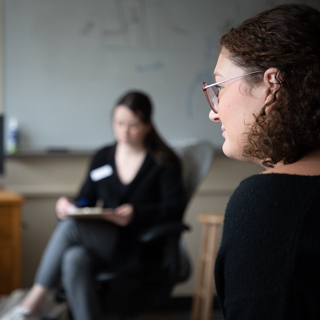Practicum Overview
BSW
Practicum offers students an invaluable chance to immerse themselves in social work practice within a nurturing learning environment. It bridges the gap between academic knowledge and real-world application, fostering professional growth under the guidance of Social Work faculty and Agency Field Instructors. Key benefits of the Practicum include:
- Merging academic learning with practical experience
- Cultivating professional self-awareness and responsibility
- Applying social work skills and theories in practice
- Making ethical decisions aligned with social work principles
Bachelor's students in social work dedicate 450 hours to direct fieldwork, averaging 15 to 20 hours weekly across two semesters. Through careful planning, students can maximize their field experience. The Student Handbook's Field Education section offers vital details and necessary forms. For any inquiries or issues regarding the practicum, students are encouraged to contact the Director of Field Education, Kat Werner, or the Assistant Director of Field Education, Katie Karas.
MSW
The practicum or field education component is a core part of the MSW experience and is often considered the heart of social work education and its signature pedagogy. The practicum provides students the opportunity to engage in supervised practice consistent with the mission, goals, and objectives of the MSW Program. The experience fosters the integration of empirical and practice-based knowledge, promotes the development of professional competence, and provides opportunities for students to identify with the profession's purpose, values, and ethics. In short, practicum serves as a bridge from the classroom to the community and hands-on practice.
MSW students dedicate 900 hours total to practicum over two academic years. This averages approximately 15-20 hours per week throughout the fall and spring semesters. Most students change their practicum site between their first and second year to ensure diverse and challenging learning opportunities. Proactive planning ensures students get the most out of their field experience, and the field education team is available to provide information and support before and throughout the practicum experience. The details of this process are outlined in the MSW Handbook. Students can bring any questions or concerns to the field education team by emailing um.sw.fieldoffice@umontana.edu.
Generalist Year
During the generalist practicum, which involves 450 hours of concurrent placement alongside classroom courses, students can cultivate self-awareness while applying generalist social work knowledge, values, ethics, and practice skills. Practicum also offers a platform for students to enhance their oral and written professional communication and receive educational supervision from an Agency Field Instructor. Students in the generalist practicum will develop the ability to critically assess, implement, and evaluate agency policies to improve the social well-being of the agency's clientele. Generalist practicum placements are comprehensive and encompass various agencies, providing students with exposure to diverse social work roles and functions and opportunities to work with historically underserved populations.
Specialization Year
In the 450-hour specialization year practicum, which runs concurrent to classroom learning, the focus is on achieving the curricular objectives specific to this year and building on the generalist year's practice foundation. Practicum will enable students to acquire advanced knowledge and skills relevant to an integrated practice focusing on trauma-informed, anti-racist, and anti-oppressive practice, work in rural and Indigenous communities, and develop leadership skills.
MSW Advanced Standing
The practicum or field education component is a core part of the MSW experience. The practicum provides students the opportunity to engage in supervised practice consistent with the mission, goals, and objectives of the MSW Program. The experience fosters the integration of empirical and practice-based knowledge, promotes the development of professional competence, and provides opportunities for students to identify with the profession's purpose, values, and ethics.
For MSW Advanced Standing students, 600 hours are dedicated to the practicum throughout one academic year. This equates to an average commitment of 20 hours per week during the fall and spring semesters. Proactive planning is key to ensuring that students maximize the benefits of their field experience. The MSW Handbook outlines the specifics of this process, and any questions or concerns can be directed to the Director of Field Education, Kat Werner.
